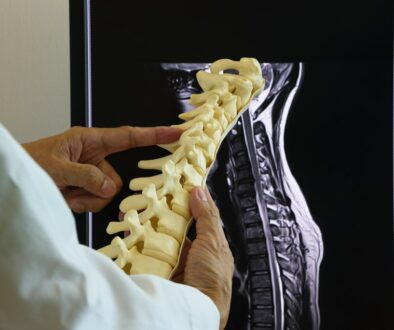Ankle Arthritis: Treatment Options from a Local Expert
Living with ankle arthritis can feel like carrying an invisible burden that weighs you down with every step. This common condition, characterized by the degeneration of cartilage in the ankle joint, can significantly impact your daily life. However, understanding its causes, treatment options, and potential need for ankle surgery can help you manage the condition more effectively. Dr. David Beck, orthopedic surgeon with CMC Orthopaedics, weighed in on this condition and offered us some understanding of the treatment options for the continued pain and limiting mobility that ankle arthritis causes.
What is Ankle Arthritis?
Ankle arthritis occurs when the cartilage that cushions the ends of the bones in your ankle joint wears down, leading to pain, swelling, and stiffness. Over time, this can make walking and other activities increasingly difficult. Dr. Beck explained, “Ankle arthritis is often the result of previous injuries such as fractures or severe sprains. It can also develop due to wear and tear over the years, particularly in athletes or individuals with physically demanding jobs.”
![Ankle Arthritis_825935690 [Converted]-01 Ankle Arthritis_825935690 [Converted]-01](https://www.conwaymedicalcenter.com/wp-content/uploads/2024/07/Ankle-Arthritis_825935690-Converted-01.jpg)
Symptoms to Watch For
Common symptoms of ankle arthritis include:
- Pain and tenderness in the ankle
- Swelling around the joint
- Stiffness and reduced range of motion
- Difficulty walking or bearing weight on the affected foot
- A sensation of instability or the ankle giving way
If you experience any of these symptoms, it’s important to consult with a healthcare provider to determine the cause and appropriate treatment.
Exploring Treatment Options
“Historically, treatment options for ankle arthritis and pain were limited,” recounted Dr. Beck. “ However, today, because of medical advancements, our patients have so many more viable treatment options to keep them on their feet.”
Dr. Beck listed several of the treatment avenues you can explore before considering surgery:
- Lifestyle Modifications: Reducing activities that put stress on your ankle can help manage pain. “I often advise my patients to switch to low-impact exercises such as swimming or cycling,” said Dr. Beck. “Maintaining a healthy weight is also crucial, as extra pounds put additional strain on the joints.”
>>> Read More: Modifying Your Behavior for Weight Loss - Medications: Over-the-counter pain relievers like ibuprofen or acetaminophen can help alleviate symptoms. In some cases, you may be prescribed stronger medications or corticosteroid injections to reduce inflammation and pain.
- Physical Therapy: A physical therapist can design a personalized exercise program to strengthen the muscles around the ankle, improve flexibility, and enhance joint stability. “Physical therapy plays a key role in managing ankle arthritis,” Dr. Beck noted. “It helps maintain joint function and can delay the need for surgical intervention.”
- Assistive Devices: Using braces or orthotic inserts can provide additional support and relieve pressure on the affected joint. Walking aids such as canes may also be beneficial for reducing pain during movement.
- Alternative Therapies: Some patients find relief through alternative treatments like acupuncture, massage therapy, or supplements such as glucosamine and chondroitin. While evidence of their effectiveness varies, these therapies can be part of a comprehensive treatment plan.
“How we treat your ankle arthritis, comes down to an old-fashioned conversation,” shared Dr. Beck. “No patient is the same as the next and your treatment plan won’t be the same as the next. We’ll meet, do our assessments, and go in-depth into the issues you are experiencing. I also like to learn more about you and get a better understanding of your lifestyle and the things you want to get back to doing. From there, we discuss the options available to you and what can get you back to doing those things that are important to you.”
We’re Here for You!
A Better Life is a Click Away.
When Does Surgery Become Necessary for Ankle Arthritis?
Despite best efforts with conservative treatments, some patients may still experience significant pain and disability. In these cases, surgery might be considered. Dr. Beck explained, “Surgery is typically reserved for patients who have not responded to other treatments and whose quality of life is severely affected by their ankle arthritis. They’ve exhausted all other options.”
Several surgical options are available, including:
- Arthroscopic Debridement: This minimally invasive procedure involves removing loose cartilage, bone spurs, and inflamed tissue from the joint.
- Ankle Fusion (Arthrodesis): This procedure involves fusing the bones of the ankle joint together to eliminate pain. While it reduces flexibility, it can provide significant pain relief.
- Total Ankle Replacement: In this surgery, the damaged joint is replaced with an artificial implant. This option can preserve more natural movement compared to fusion.
Dr. Beck emphasized the importance of individualized care: “Every patient’s situation is unique, and the decision to proceed with surgery is made after careful consideration of my patient’s overall health, activity level, and personal goals. Surgery is rarely the first option of treatment, yet when it becomes the only option, it’s still up to my patient to make the call of what is best for them.”

READ MORE:
Ankle Surgery: When is it Necessary?
Understanding treatment options for ankle pain and limited mobility.
Taking the Next Steps
Living with ankle arthritis can be challenging, but understanding your condition and exploring various treatment options can help you manage your symptoms effectively. Consult with a foot and ankle orthopedic provider to develop a personalized plan that suits your needs.
As Dr. Beck reminded us, “Although damage caused by arthritis is permanent, your symptoms are treatable. Early intervention and a proactive approach to treatment can make a significant difference in maintaining your quality of life.” By staying informed and working closely with your healthcare team at CMC Orthopaedics, you can navigate the challenges of ankle arthritis and take steps toward a more comfortable and active future.
Help for Ankle Arthritis Near You
With two locations in Horry County, CMC Orthopaedics is here to help you manage and treat your arthritis. Dr. David Beck is our fellowship-trained orthopedic foot and ankle surgeon and is one of a few specialists in the region offering total ankle replacement surgery. Whether you are suffering from chronic foot or ankle pain, or an acute foot or ankle injury, Dr. Beck can help you work through all of your treatment options to reduce your pain and help you regain your mobility as quickly as possible. CMC Orthopaedics looks forward to helping you take your next steps in the right direction.
843-347-8041

Dr. David Beck
Fellowship trained in Foot and Ankle at Mercy Medical Center
Dr. David Beck completed his undergraduate education at Amherst College in Massachusetts, where he received a bachelor’s degree in Economics and Psychology and was a starter on the varsity lacrosse team. He earned his medical degree from the New York University School of Medicine in Manhattan, New York. Following medical school, Dr. Beck completed his orthopaedic surgery residency at Thomas Jefferson University Hospital in Philadelphia, Pennsylvania learning from the orthopaedic surgeons from the Rothman Orthopaedic Institute. After residency, he completed a fellowship at the Institute for Foot and Ankle Reconstruction at Mercy Medical Center in Baltimore, Maryland.






